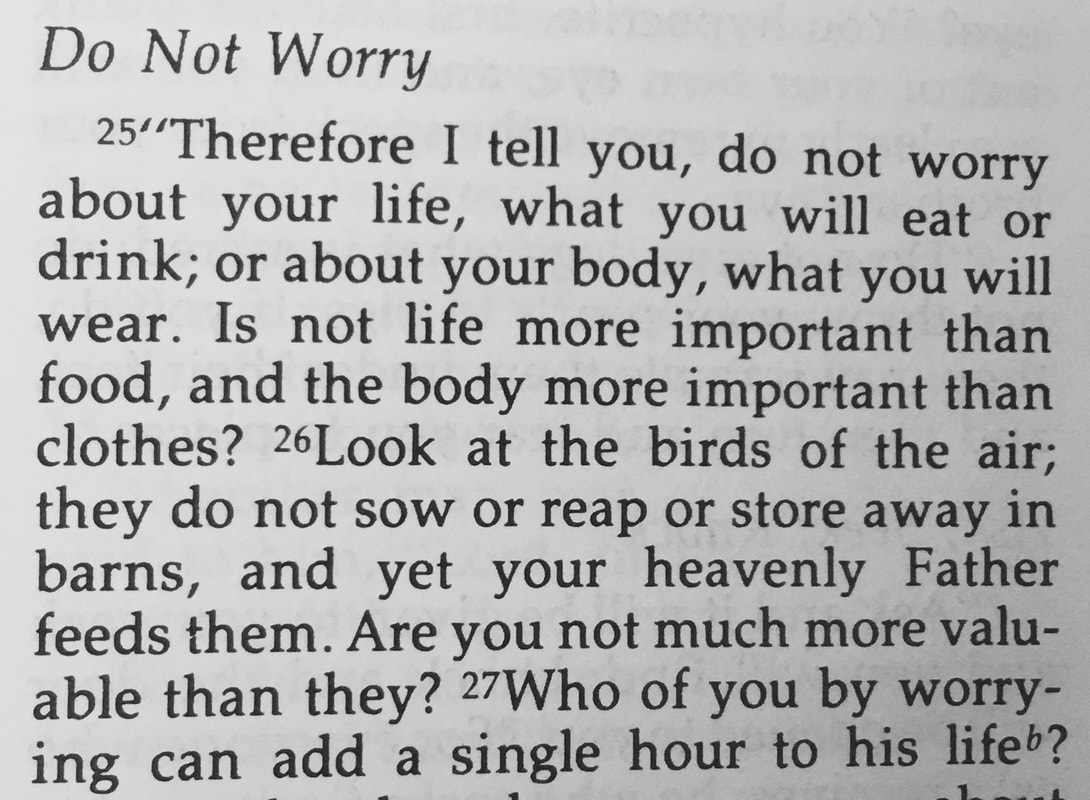| Our Scripture reading for Sunday was Matthew 6:25-34, from the New International Version. Rich Doty was the proclaimer. The text of his proclamation is below. There was no recording this week. Links to resources used in Worship are on our website. |
and this meditation of my heart,
be pleasing in your sight LORD.
Sherlock Holmes and Dr. Watson are on a camping trip. In the middle of the night Holmes wakes up and gives Dr. Watson a nudge. “Watson, he says, “look up in the sky and tell me what you see.”
“I see millions of stars, Holmes,” says Watson.
“And what do you conclude from that, Watson?”
Watson thinks for a moment, “Well,” he says, “Astronomically, it tells me that there are millions of galaxies and potentially billions of planets. Astrologically, I observe that Saturn is in Leo. Horologically, I deduce that the time is approximately a quarter past three. Meteorologically, I suspect that we will have a beautiful day tomorrow. Theologically, I see that God is all-powerful, and we are small and insignificant. Uh, what does it tell you, Holmes?”
“Watson, you idiot! Someone has stolen our tent!”
I confess today that it feels like someone has also stolen my tent, a tent that provided shelter, and safe haven. I feel like we are living in unusually fearful times and I am out in the elements. I wonder if this is an appropriate response. I’d like to explore today if these are perilous times, and if so what a faith response might look like.
I grew up in Dallas during the 1950s. We think of the 1950s fondly, rewinding “American Graffiti” and “Happy Days” in our minds. But for me it was also a time of weekly air raid sirens, back yard bomb shelter displays in front of Cobb’s Drug Store, and unspoken fears from protective adults. I can remember being at my elementary school and hearing the police whistle over the PA system. It made my stomach drop with dread - every week. Was this our usual duck and cover air raid drill, or was this the time that Russia had really decided to really drop an atomic bomb on North Dallas. We would silently file out of our schoolrooms and into the hall, crouching down with one arm under our eyes, the other covering our neck. These two small children’s arms were supposed to protect us from nuclear radiation and building timbers raining down upon us. And in one form or another, I think I have lived in some kind of nagging fear or worry my whole life. As the philosopher Roseanne Roseannadanna said, “It’s always something.”
When I was young I feared losing my remaining parent to cancer of course, but when I became aware of the larger world around me there were also fears of not only nuclear war, but also the domino theory, the silent spring, the countdown clock, over population, and more recently climate change, colony collapse, antibiotic resistant bacteria, nuclear weapons again, over population again, and now great fears for the direction of our country.
In 1930 poet and playwright Edna St. Vincent Millay observed during an illness, “life isn’t one damn thing after another, it’s the same damn thing over and over.”
So for perspective, are our times unique?
If we were living in the time of Jesus we would be talking about high taxes and the need for relief. We would wistfully imagine a bipartisan working relationship between red state Zealots, Blue state Nazarenes, and Purple state Essenes and Pharisees. We would, to foreshadow Ronald Reagan, joke that the last thing we would want to hear is “We’re the Romans and we’re here to help.” Remember the troubling verse in Deuteronomy where God tells his people to utterly destroy the Canaanites, leaving nothing that breathes? It seems we have always had trash talk from the top, because the Canaanites are with us today according to recent genome research. We call them Lebanese. And then as now, we would be concerned about existential threats, threats to our lives, to our culture, to our country’s very existence. It seems we have always had Barbarians, be they Emperors, Goths and Visigoths, or Kim Jong-un. Harry Truman said “there is nothing new in the world, except the history you do not know.”
If our times aren’t unique, is the severity of the issues that we face worse?
Are we the most divided we have ever been as a country? No, that would be the civil war.
Are we closer to war because of Kim Jong-un’s missiles? No, that would be the Cuban missile crisis.
Do we have greater disparity in wealth today? No, that would be the gilded age.
Do we have the most corrupt government because of Citizens United and big money influence? No. That would be the gilded age again, where President Rutherford B Hayes wryly said that we had a government “of the corporation, by the corporation and for the corporation”.
Is basic civility worse in Congress? No. Preston Brooks almost killed Charles Sumner with a long vicious cane beating on the senate floor in 1856 for Sumner’s anti-slavery speech. Brooks struck Sumner so many times that his cane broke and splintered, and he kept on striking. Southern lawmakers wore rings of the cane pieces around their neck chains in solidarity with the attack.
And I could describe worse times in American history - for health care, for our social safety net, police abuse, white supremacists, and on and on.
So while we can take some comfort in the perspective that these are not the worst times, or even unusual times, each day has enough trouble of its own. We still have huge challenges. So how should people of faith respond?
I have 4 suggestions, more for me, than for you.
Number One: Don’t Worry.
Our scripture today tells us we should not worry because God will feed and cloth us if we just seek the kingdom of God, and righteousness. As proof of this Jesus has us look at the birds of the air and lilies of the field who, while lesser than we humans, are fed and clothed by God. When I was younger I thought this was a troubling verse because in a world with huge disparities of wealth there exist the faithful who also suffer from great deprivation. Where was God’s guiding hand? But I have rethought these verses and hopefully now I am not confusing the poetry with the point. Its not that we don’t have to worry because God will take care of us so much as we shouldn’t worry because worrying doesn’t work. We can prepare for tomorrow, we can imagine different tomorrows, we can, most importantly, work for the tomorrow we want to see (which is seeking righteousness), - but worrying adds nothing. Worrying is the mental squirrel cage where we imagine worst outcomes, over, and over, and over again. It buys us nothing - and depletes us. If worry is about imagining worst outcomes, hope is the antidote. Hope is the vision of God’s possibilities. We create hope with the discipline of gratitude, knowing –and feeling – that we are not alone, and working towards our dreams.
Hope leads us to. . .
Number Two: Live in Balance.
We live in a 24-hour news cycle. It’s the digital equivalent of a newsboy yelling “EXTRA EXTRA READ ALL ABOUT IT!” right in your ear, all day long. Years ago when I worked for KTVT television in the Dallas Fort Worth market, the news department used to say, “if it bleeds it leads,” and they were for-real ambulance chasers. The lead story was the news that was the most compelling, the most liable to make you tune in and stay with the channel, not necessarily the story that would make you smarter, or a better-informed voter, or uplifted. Stories that made you angry or fearful, or voyeuristic of tragedy topped the list. We love our hurricane coverage, be it meteorological, political or interpersonal. And haven’t we had a lot of hurricanes lately?
It’s amazing to me to read the Economist magazine and see all the parts of the world that no one else covers. Fake news is a problem to be sure, but partial news makes us loose balance and perspective. The bad and sensational crowd out everything else. My wife’s cousin wakes to an hour of prayer and reading the Psalms to frame his day. I typically wake up and spend my hour with The Washington Post, Talking Points Memo, Axios, Politico, 538 and the Huffington Post. You can see the problem. Imagine being in a 24-hour spiritual cycle. How strange it sounds, and how transformative it would be.
Number three: Explore outside your bubble, talk to someone you don’t agree with and find common ground.
I heard the past president of Oklahoma University speak a few years ago. David Boren had formally been an Oklahoma senator and chairman of the Senate Select Intelligence Committee. He said that congress really started to get dysfunctional and hyper partisan when congress started to go home on weekends instead of staying in Washington. In the past, congressmen and senators had grown to know each other outside of work. Their spouses had become friends; their children had played together. And while they could disagree on an issue, they knew that by in large, members of the other party were good people who just had different opinions and constituencies. They were not the enemy. Regrettably, now they don’t know each other.
For the most part I live in a bubble of people like me, and you might too. I value the few friends I have who view politics and religion differently and yes, we sometimes step carefully. When I say to the TV, “how could you possibly believe that!” this is usually my bubble talking, and that could mean I’m not listening. Texas columnist Mollie Ivans said she took Rush Limbaugh seriously because he was the only one talking to the disaffected. Are we listening to the disaffected? It might be good for them to know you. You can disagree on anything, but if you can’t at least understand another’s heart it’s a slippery slope from just disagreement to having an opponent, from an opponent to an enemy.
And how do any of us feel surrounded by enemies?
Number 4: Keep your sense of humor.
Then they reminded Jesus that adultery was punishable by stoning under Mosaic law and challenged him to judge the woman so that they might then accuse him of disobeying the law. Jesus thought for a moment and then replied, “He that is without sin among you, let them cast the first stone at her.”
Just then, a stone flew by Jesus’s head.
Surprised, he turned and said, Mom?
Doesn’t that feel good to laugh? Life is wonderful, and scary, and absurd all at the same time. Gene Roddenberry, screenwriter and creator of Star Trek, said, “We must question the story logic of having an all-knowing, all-powerful God who creates faulty humans, and then blames them for his own mistakes.” What I question is Roddenberry’s theology. God, as Jesuit Father Greg Boyle says, “just wants to love us.” And I think if we live in that space of grace rather than the manufactured reality we are presented with, we can live in balance, live in hope rather than worry, be a light unto others, and fully become the children of God.
Amen




 RSS Feed
RSS Feed
